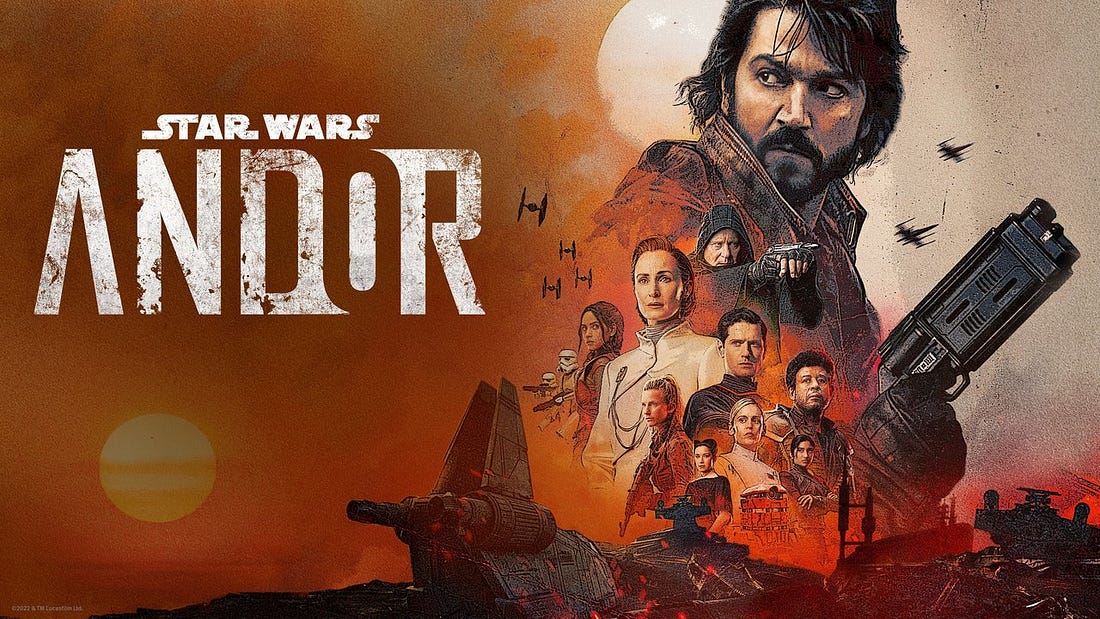
Starring Diego Luna, Kyle Soller, Adria Arjona, and Stellan Skarsgård
Rated TV-14 for language and violence
Distributed by Disney Platform Distribution.
Author’s note: This review contains spoilers.
I believe we are in crisis. The distance between what is said and what is known to be true has become an abyss. Of all the things at risk, the loss of an objective reality is perhaps the most dangerous. The death of truth is the ultimate victory of evil. When truth leaves us, when we let it slip away, when it is ripped from our hands, we become vulnerable to the appetite of whatever monster screams the loudest. —Mon Mothma, Andor, “Welcome to the Rebellion”
Early on I knew that something about Andor was different. The show’s first episodes aren’t like other modern TV—they don’t rush into establishing seemingly impossible situations or deliver instant action and quippy one-liners. Instead, they do something remarkable for a 21st-century TV show: They take their time to develop characters.
Those first few episodes of Andor are a kind of test, filtering out the people who lack the patience and attention to detail for what the show is about to deliver. This is not a show for people who like Star Wars primarily for its lightsabers, blasters, and space battles. This is a show for people who care about stories and ideas.
Those who pass the test are duly rewarded with an expertly crafted work of television that consistently maintains high standards of storytelling, character development, acting, and production. It tells the story of Cassian Andor (Diego Luna), a lifelong thief who cares about little other than finding his lost sister. But in the course of searching for her, he becomes the target of both an oppressive local police force and the Galactic Empire’s Imperial Security Bureau (ISB). As he tries to evade capture, he becomes embroiled in the fight between the Empire and the nascent Rebellion—a conflict he initially joins only for money, until his experiences begin to teach him the value of fighting for freedom.
Although Cassian is the show’s main character, Andor is really an ensemble series. Its early investment in the relationships between Cassian and the other characters in his adopted home of Ferrix pays off in droves when he is later separated from them; we care about their fate because we have gotten to know and like them. The show also spends time developing the villains pursuing Cassian, especially the overzealous security officer Sybil Kahn (Kyle Soller) and the coldly scheming ISB agent Dedra Meero (Denise Gough). This gets viewers invested in these characters’ stories, and we see positive characteristics in them that make us root for them to have a change of heart.
Both seasons of Andor deliver a tightly integrated theme, something almost unheard-of in modern television. Both deal with the importance of freedom and the evil of tyranny, but whereas the first focuses more on how tyrants destroy others’ lives and the vital importance of fighting back even in the face of overwhelming odds, the second explores the price of that resistance as well as how evil ultimately destroys itself and those who embrace it.
Although Andor is a prequel to 2016’s Rogue One (itself a prequel to 1977’s Star Wars), no prior familiarity with the Star Wars franchise is needed to get value from the show. Rather, Andor’s story adds the depth and character background necessary to give Rogue One the gravitas it needs, and the movie feels more complete as a conclusion to Andor than it did as a stand-alone film. Further, Andor does not rely on any of the Star Wars universe’s mystical lore about the Force or the Jedi. Whereas the actions of characters in many Star Wars stories only make sense in the context of the Force existing (such as following one’s feelings to win a battle), Andor’s heroes take logical actions and embody rational principles that are consistently applicable to the real world.
Although a good portion of the credit for what makes Andor great belongs to writer and director Tony Gilroy, the show’s outstanding performances play a crucial role in bringing the story and its themes to life. Besides those already named, special mentions must go to Andy Serkis as Kino Loy, another character whose journey shows him the value of fighting for freedom; Anton Lesser as Major Partagaz, who is about as close to sympathetic as it’s possible for an ISB officer to be; and Stellan Skarsgård as resistance cell leader Luthen Rael. Rael delivers some of the show’s many compelling monologues, including one dealing with the personal cost of choosing to fight for what’s right even if you may never see the benefits yourself:
I’ve given up all chance at inner peace. I’ve made my mind a sunless space. I share my dreams with ghosts. I wake up every day to an equation I wrote fifteen years ago from which there’s only one conclusion: I’m damned for what I do. My anger, my ego, my unwillingness to yield, my eagerness to fight, they’ve set me on a path from which there is no escape. I yearned to be a savior against injustice without contemplating the cost and by the time I looked down there was no longer any ground beneath my feet. What is my sacrifice? I’m condemned to use the tools of my enemy to defeat them. I burn my decency for someone else’s future. I burn my life to make a sunrise that I know I’ll never see. And the ego that started this fight will never have a mirror or an audience or the light of gratitude.1
It’s truly remarkable that Andor got made in our time, given that the vast majority of entertainment media in the past decade have lacked integrated themes, skilled writing, strong character development, and moral clarity. Andor is a slow, deliberate show that takes its time to set up storylines properly. It’s a show that deals with serious themes and never belittles them with ham-fisted messaging or dramatically inappropriate humor. It’s a show that eschews CGI glitz and over-the-top action in favor of gritty sets, real locations, and dialogue-driven tension. Moreover, it’s a show that conveys a message about the importance of truth, freedom, and integrity. It’s everything we don’t see in modern TV—everything we sorely need today.
As for the Star Wars franchise, comparing Andor to even the better Disney-era entries is like comparing Les Miserables to a collection of pulp novels. It’s long been widely accepted among Star Wars fans that The Empire Strikes Back is the franchise’s best entry. Few thought a new production could ever challenge that, but Andor has. Star Wars was always at its best when it focused on rebellion against tyranny, and Andor has finally taken that premise and delivered on it in full.
Andor, “One Way Out," November 9, 2022. ↑





